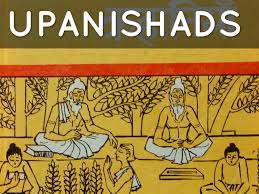THE MEANS TO THE KNOWLEDGE OF THE HIGHEST SELF
Praśnopaniṣad (प्रश्नोपनिषद्) consists of six questions asked by six students to the great Seer, Pippalada. At the very outset of his commentary, the Ādī Śaṅkarācārya, points out that this Upaniṣad serves to teach the methodology, the means, for the attainment of Higher Knowledge (parā vidyā) as enunciated in Muṇḍaka Upaniṣad.
This Upaniṣad uses the word ‘Purusha’ to denote the Ātman (Self) or the Brahman. Both of these words, Ātman and Brahman, refer to the same Reality: The Attributeless, Unchanging, Conscious Principle that pervades within and without all and everything. Śrī Śaṅkarā says that Purusha is so called because all that is here is permeated by Him, or because He reposes within the body of the creatures. [Panoli, op. cit., p. 103].
To the question, ‘Where is that Purusha (कासो पुरुष?), the Upaniṣad reveals: इहैव अन्तःशरीरे …स पुरुषः Here itself, within the body, is that Purusha. [Praśna 6-2]
Śrī Śaṅkarā explains:
हृदयपुण्डरीकाकाशमध्ये हे सोम्य स पुरुषः, न देशान्तरे विज्ञेयः ।
Here itself, within the body, in the space within the lotus of the heart, is that Purusha to be sought for, and not in any other place. [Emphasis added].
An ordinary person cannot think of the Self without the limiting adjuncts, like the limbs of body, superimposed on the Self out of ignorance (इवात्मन्यविद्याध्यारोपितरूपा). The Upaniṣad provides the methodology of removal of what is erroneously superimposed on the Self due to ignorance.
Superimposition (Adhyāsa) or Nescience (Avidyā)
According to Vedānta, this is the fundamental metaphysical error: superimposing the limiting adjuncts of the body, mind, and senses on the Limitless Self. Śrī Śaṅkarā calls this intrinsic misconception ‘adhyāsa’ —a technical term to denote an innate, natural, and beginningless human tendency of the nature of delusion or misconception (mithyāpratyaya), denoted by the word ignorance (avidya). In the very beginning of his masterly introduction to the Brahma-Sutra Bhāṣya, entitled ‘Adhyāsa Bhāṣya,’ Śrī Śaṅkarā states:
मिथ्याज्ञाननिमित्तः सत्यानृते मिथुनीकृत्य ‘अहमिदम्’ ‘ममेदम्’ इति नैसर्गिकोऽयं लोकव्यवहारः
Owing to the erroneous knowledge about the entities and their attributes which are ever absolutely distinct , by mixing the Real with the Unreal, one naturally assumes the attitude ‘This am I, ’ (अहमिदम्) ‘This is mine,’ (ममेदम्) in one’s dealings. [trans., Panoli, p. 6]
Therefore, adhyāsa means to mis-take one thing for the other mutually between Ātman (Self) which is our essential nature, and the adventitious anātman (non-self), the psychosomatic apparatus, the body-mind-senses complex. Śaṅkarā provides several examples of this mutual superimposition or misappropriation (seeing of something as some other thing) starting from the body all the way up to the ego:
- When one’s wife, sons and the like happen to be weak or healthy, one thinks, “I am weak or sound,” and superimposes on the Self the attributes that are external to it.
- Similarly, one superimposes on the Self such attributes of the body as, ‘I am stout,’ ‘I am lean,’ ‘I am fair’ and such attributes of the sense organs as ‘I am sharp’ or ‘I am slow’ and so forth.
- Likewise, one superimposes the attributes of the ego, the ‘me-notion,’ on to the inner Self (the unchanging Witness of all modifications of the internal organ—antaḥkaraṇa) and vice versa.
As a result of this mutual superimposition (adhyāsa) of the Self and the non-self alone, says Śaṅkarā, all of us entertain a notion of doership and enjoyership (कर्तृत्वभोक्तृत्व). This is superimposition is without beginning and the end (अनादिरनन्तो), natural (नैसर्गिक), delusive (मिथ्याप्रत्ययरूपः), productive of the notion of doership and enjoyership (कर्तृत्वभोक्तृत्वप्रवर्तकः), and something which is experienced by all (सर्वलोकप्रत्यक्षः).
Śrī Śaṅkarā concludes the Adhyāsa Bhāṣya stating, categorically:
अस्यानर्थहेतोः प्रहाणाय आत्मैकत्वविद्याप्रतिपत्तये सर्वे वेदान्ता आरभ्यन्ते ।
All the Vedānta-texts, proceed with the sole aim of destroying this superimposition, which is the root of all evil, for the attainment of the knowledge of the unity of the Self. [ibid., p. 9]
The Glory of Self-Knowledge
In the concluding part of this wisdom text (Praśana 6), it is extolled:
अरा इव रथनाभौ कला यस्मिन्प्रतिष्ठिताः ।
तं वेद्यं पुरुषं वेद यथा मा वो मृत्युः परिव्यथा इति ॥ ६ ॥
Know that knowable Purusha in which parts are fixed like spokes in the nave of a chariot wheel, so that death may not torment you.
Having instructed disciples thus, Pippalada said to them:
तान्होवाचैतावदेवाहमेतत्परं ब्रह्म वेद नातः परमस्तीति ॥ ७ ॥
I only know this far the Supreme Brahman, worthy to be known; there is nothing higher than this to be known. [Trans., Panoli, p. 103.] [Emphasis added]
Finally, at the very end of Praṣanopaniṣad, after Pippalada had instructed his disciples about the Supreme Brahman, who dwells within us all as Purusha, the disciples, with heart gladdened and over-flowing with gratitude, worshiping the teacher, said:
You indeed are our father who guides us to cross to the other shore of ignorance (avidyāyāḥ param pāram). Adorations to the great Rishis; adorations to the Great Rishis.” [Praśnopaniṣad 6-8].
Śrī Śaṅkarā writes in his masterly commentary to this mantra, thusly:
You are our father, indeed, for you have, by imparting knowledge to us, created Brahma-śarīra (Brahman-body), Eternal, Undecaying, Deathless and Fearless, for you alone have guided us by means of the boat of knowledge, to cross to the other shore, called ‘final release’ from which there is no return, across the ocean of ignorance (avidyāyāḥ param pāram)…Therefore, your parenthood towards us is in more fitness than that of the others (i.e., one’s natural father). The other father, who begets the physical body alone is yet the most worshipful in the world, what to speak of one who leads us to absolute fearlessness [by revealing to us that ‘we are not the physical body.’[1]] [Translation based on Sri V. Panoli, pp. 102-104; Swami Gambhirananda, pp. 502-503].
My sāṣtānga obeisances to the Lord, the Bestower of the Song Celestial, who converts difficulties on the path into pilgrim’s joy.
[1] देहम नाहं; कोहम? सोऽहं! I Deham nāhaṁ; Koham? So’haṁ! I am not the body; Who Am I? I am THAT!~Sri Ramana Maharshi


Recent Comments